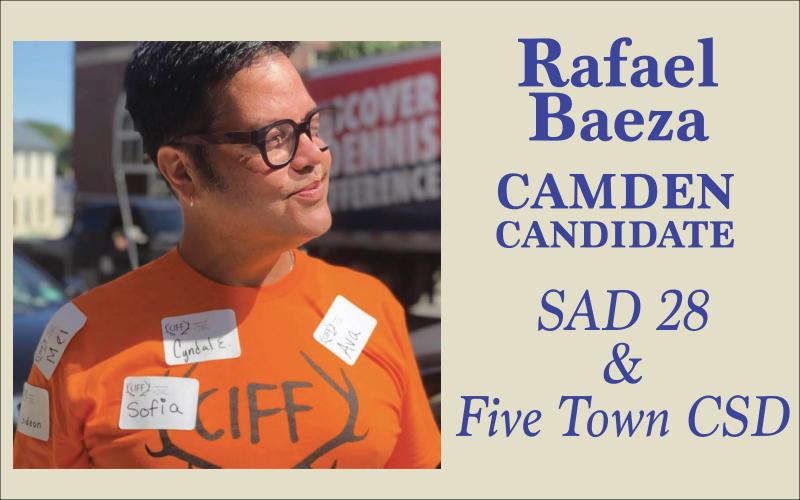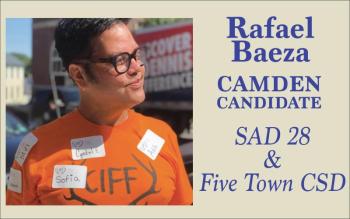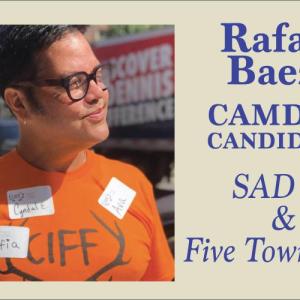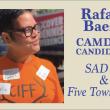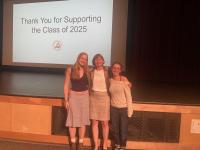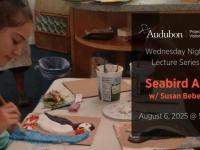SAD 28 and Five Town CSD Board Camden Candidate Rafael Baeza
On June 10, Camden will vote for two candidates from a field of four candidates to serve on the School Administrative District 28 (Camden-Rockport K-8) and Five Town CSD (Camden Hills Regional High School) school boards.
PenBayPilot.com has circulated questions to school board candidates, who include Rafael (Rafi) Baeza, Rebecca Flanagan, A. Taylor Pohlman and Sarah E. Smith. Here, Rafael (Rafi) Baeza responds.
Please present a short biography of yourself.
I grew up in Camden, and attended our schools from Kindergarten through high school. I am a proud member of Camden-Rockport High School Class of 1986. I went on to Bowdoin College and earned a degree in neuroscience, followed by a BFA in Graphic Design from the California College of the Arts in San Francisco.
I currently serve as the Creative Director at the Farnsworth Art Museum and previously led Marketing and Communications at Maine Media. I also taught media classes at Camden Hills for three years, where my students earned state awards and I was twice nominated as Teacher of the Year.
As a longtime community member and parent of two Camden Hills graduates, I understand the unique strengths and challenges of our schools and our town. I’m committed to fostering an inclusive, innovative educational environment that reflects the values and needs of everyone in our district — students, families, educators, and residents alike. I will work hard to represent your interests with transparency, dedication, and a deep respect for the entire community.
What do you hope to accomplish as a public K-12 school board member for your town?
I aim to promote transparency, improve district communication with the community, and ensure that we are meeting the diverse needs of all students in our school.
How do you view the role of public education in the U.S., in Maine, and in Camden and Rockport?
I see public education as a vehicle for preparing our youth for college and career. Our schools work best when all stakeholders at all levels are well-informed and highly-engaged. In an increasingly uncertain and rapidly-changing world, it is more important than ever that we provide a quality education for all students. Public education addresses the achievement gap across society, provides opportunities, strengthens our democracy and grows our economy.
Should pre-K programs be expanded?
I support pre-K programs as they help children develop critical early learning skills, close achievement gaps, and strengthen our future workforce. Quality early education leads to better academic outcomes, higher graduation rates, and long-term economic benefits for our families and community.
To evaluate whether Camden’s pre-K programs should be expanded, I would look at current enrollment numbers, funding sources, and whether there’s unmet demand among local families. I’d also consider opportunities for state grants and partnerships with local organizations to support growth. These insights would guide responsible budgeting and help ensure equitable access to early education for all Camden children.
Is the free meal program worthwhile and is there enough local fresh food from area farms being integrated into the meal program?
Our free lunch program is unquestionably worthwhile. During my time teaching at the high school, the absence of such a program often resulted in students being penalized for unpaid meal balances. Incorporating fresh, locally sourced food from area farms is certainly ideal, as it supports both student health and the local agricultural economy. However, it’s also important to ensure the meals are not only nutritious but appealing and enjoyable for students. Our dedicated kitchen staff deserve the resources and support necessary to make this a reality.
Does the curriculum adequately teach all children and teens about their role in a participatory democracy?
Yes, I believe it does. U.S. history and civics are part of our school curriculum, and our teachers actively encourage student engagement through discussions about voting, advocacy, and civic responsibility. We also have student representatives on our School Board, which is a great example of youth involvement in democratic processes. Additionally, I support creating more opportunities for students to express their views—whether through our school newspaper, student government, or digital platforms—so they can learn how to organize, advocate, and make their voices heard.
Should the subject of personal finance be addressed in all grades?
I believe that personal finance is an essential subject and I am pleased that it is currently a mandatory high school elective. I feel it is most relevant for Juniors and Seniors who are approaching financial independence. At that stage, students are better positioned to grasp and apply concepts like budgeting, credit, loans, and saving for the future.
What should be integrated across all grade levels, however, is media literacy. During my time teaching at Camden Hills, I led courses in Filmmaking, TV Studio, Coding, Graphic Design, and Web Design. These classes were consistently popular because they tapped into the platforms students already engage with—YouTube, TikTok, and Instagram—and used visual storytelling to encourage critical thinking and self-expression.
In a world dominated by digital content, it’s vital that students learn to analyze and question the media they consume. By embedding media literacy throughout the curriculum, we empower students to navigate and shape their world more thoughtfully and responsibly.
Do the Camden-Rockport schools need to strengthen the science and technology curriculum. If so, how so?
Yes, our high school could strengthen its science and technology curriculum by addressing a notable gap: the absence of AP Chemistry. Currently, our high school offers AP Biology, AP Environmental Science, and AP Physics C: Mechanics in science, along with AP Computer Science Principles and AP Computer Science A in technology. These offerings demonstrate a solid foundation in advanced STEM education.
However, the lack of AP Chemistry limits opportunities for students aiming to pursue college majors or careers in chemistry, medicine, engineering, or related fields.
What is your opinion of book-banning in public school libraries? Are there any books you want pulled off the school library/classroom shelves?
I trust our educators to make informed decisions. The library is the heart of our school system, and I believe in including books that reflect a diversity of voices. I support professional development for teachers to prepare them to teach and discuss sensitive topics thoughtfully. I don’t want to whitewash our history, but rather ensure it is discussed in an appropriate and relevant context.
Maine’s position on transgender athletes participating in girls sports has resulted in a federal suit against the Maine Dept. of Education. How should the state respond?
I support Governor Janet Mills, who has spoken out against discriminatory national policies, saying, “To target a minority group—who are already targeted in other unfair ways—is a sad and cruel distraction.” We should be coming together to support all students—and refusing to give in to fear, division, or bigotry in any form. I will stand up for the rights and oppose efforts that seek to erode the civil liberties of our LGBTQ+ students.
Should the schools adopt a phone-free policy?
I’m not about locking up, but keeping up. Today’s smartphones have far more computing power than the Apollo Guidance Computer that helped land astronauts on the Moon. Rather than banning them, we should be using these powerful tools to enhance learning.
When I was teaching, I integrated cell phones into the classroom for creative projects like iPhone filmmaking. With engaging lessons and an active classroom environment, students are less likely to be distracted.
Instead of spending $30,000 on Yondr pouches to restrict phone use, we should consider investing that money in improving our school’s technology—whether that’s updated classroom equipment, better Wi-Fi infrastructure, or tools that support digital learning and creativity.
Let’s teach students how to use technology responsibly rather than avoid it altogether.
Camden and Rockport are low-receiver towns, in the eyes of the state, resulting in minimal state funding aid. How will you, as a board member, help reduce the fiscal load on the taxpayer to fund education and maintain the facilities?
Our town has an exceptional public school system, thanks in large part to the generous support of our community. However, I sense that this goodwill is beginning to erode. As a member of the 2017 Strategic Planning Committee, I helped develop a framework to guide the district, one of whose core principles was to make financially sound decisions. The plan emphasized the importance of a consistent review process to ensure resources are used efficiently and aligned with both educational priorities and fiscal responsibility.
Ballot initiatives that catch voters off guard risk undermining trust. As a board member, I believe we must commit to long-term financial planning, transparent communication, and exploring creative solutions that do not rely solely on increasing the taxpayer burden. Whether through partnerships, grants, or better use of existing resources, the district must find ways to work within its means while maintaining the high standards our community expects.
What books are you reading these days, and which do you recommend others read?
I’m currently reading Moby Dick by Herman Melville, although my true medium of choice is film. I strongly support non-narrative filmmaking and used to take my students to the Camden International Film Festival. A film I would highly recommend is the Academy Award-winning international film I’m Still Here. Based on a true story set in 1970s Rio de Janeiro, it takes place during Brazil’s military dictatorship. The film powerfully explores the disappearance of individuals who speak out against the government and the impact it has on their families.
Anything else you’d like to address? Free space!
I offer the school board a unique and valuable perspective shaped by a diverse background. As a proud Mainer who grew up in this state, and as a Chilean-American with deep cultural roots, I bring both local insight and a broader, multicultural understanding. My wife is Cuban-American, and together we value the importance of diversity, equity, and inclusion in education.
I believe representation matters. My lived experience allows me to connect with students and families from various backgrounds and advocate for policies that reflect the richness of our community. I am committed to ensuring every student—regardless of their background—has access to opportunity, support, and a high-quality education.

